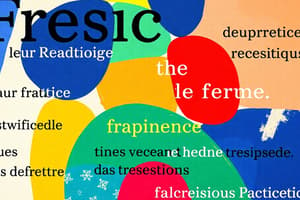Podcast
Questions and Answers
Which of the following statements about the French language is true?
Which of the following statements about the French language is true?
- French has no influence from Greek.
- French is a Romance language with over 300 million speakers. (correct)
- French is derived from Classical Latin.
- French is primarily spoken in Asia.
What is a distinctive feature of French nouns?
What is a distinctive feature of French nouns?
- Nouns have grammatical gender. (correct)
- Nouns can be pluralized by adding -ing.
- Nouns can only be masculine.
- Nouns do not change form.
What do French adjectives do in relation to nouns?
What do French adjectives do in relation to nouns?
- Adjectives are always placed after nouns regardless of gender.
- Adjectives do not change in French.
- Adjectives agree in gender and number with the nouns they modify. (correct)
- Adjectives change form based on verb tense.
Which characteristic is true of French verb conjugations?
Which characteristic is true of French verb conjugations?
What is a major challenge in French pronunciation?
What is a major challenge in French pronunciation?
How does French vocabulary primarily develop?
How does French vocabulary primarily develop?
Which of the following best describes proficiency levels in learning French?
Which of the following best describes proficiency levels in learning French?
What aspect of French culture is NOT highlighted within its literature?
What aspect of French culture is NOT highlighted within its literature?
Flashcards
Origin of French
Origin of French
French is derived from Vulgar Latin, a spoken form of Latin.
Inflected Grammar
Inflected Grammar
French has distinct grammatical rules that affect the form of words based on their function in a sentence.
Grammatical Gender
Grammatical Gender
French nouns are classified as either masculine or feminine, influencing adjective agreement.
Unique French Sounds
Unique French Sounds
Signup and view all the flashcards
Vocabulary Influences
Vocabulary Influences
Signup and view all the flashcards
French Literary History
French Literary History
Signup and view all the flashcards
French Culture
French Culture
Signup and view all the flashcards
Learning French
Learning French
Signup and view all the flashcards
Study Notes
French Language Overview
- French is a Romance language, originating from Vulgar Latin.
- It is spoken by over 300 million people worldwide, making it a significant language globally.
- French is an official language in many countries and international organizations, including Canada, France, Belgium, Switzerland, and several African nations.
- It's characterized by a complex grammatical structure and a rich vocabulary.
French Grammar
- French grammar is highly inflected, meaning words change form to reflect their grammatical role (noun cases, verb conjugations, adjective agreement).
- Nouns have grammatical gender (masculine or feminine).
- Adjectives agree in gender and number with the nouns they modify.
- French verbs have different conjugations depending on the subject and tense.
- Verb tenses are complex, reflecting various aspects of time (past, present, future, conditional, and imperfect).
French Pronunciation
- French pronunciation is relatively consistent but has some unique sounds that don't exist in many other languages, such as nasal vowels and liaison (linking).
- Understanding phonetic rules is essential for accurate pronunciation.
- There are significant regional variations in pronunciation across French-speaking regions.
French Vocabulary
- French vocabulary is heavily influenced by Latin and Greek, and it uses a lot of derivation (forming new words from existing ones).
- Loanwords from other languages, particularly English, have become increasingly common.
- French distinguishes between formal and informal registers of language use.
French Culture and Literature
- French literature has a rich history, producing renowned authors like Voltaire, Molière, Victor Hugo, and Sartre, who have significantly shaped international literary traditions.
- French culture is associated with various aspects, including art, architecture, philosophy, and gastronomy.
- French cinema and music are also internationally recognized.
French Language Learning
- Learning French involves understanding its complex grammar, vocabulary, and pronunciation systems.
- Proficiency levels are generally categorized into A1 (basic), A2 (elementary), B1 (intermediate), B2 (advanced), and C1 and C2 (proficient).
- Modern language learning methods are often incorporating technology like language learning apps and online resources to accelerate the process of learning.
Studying That Suits You
Use AI to generate personalized quizzes and flashcards to suit your learning preferences.




